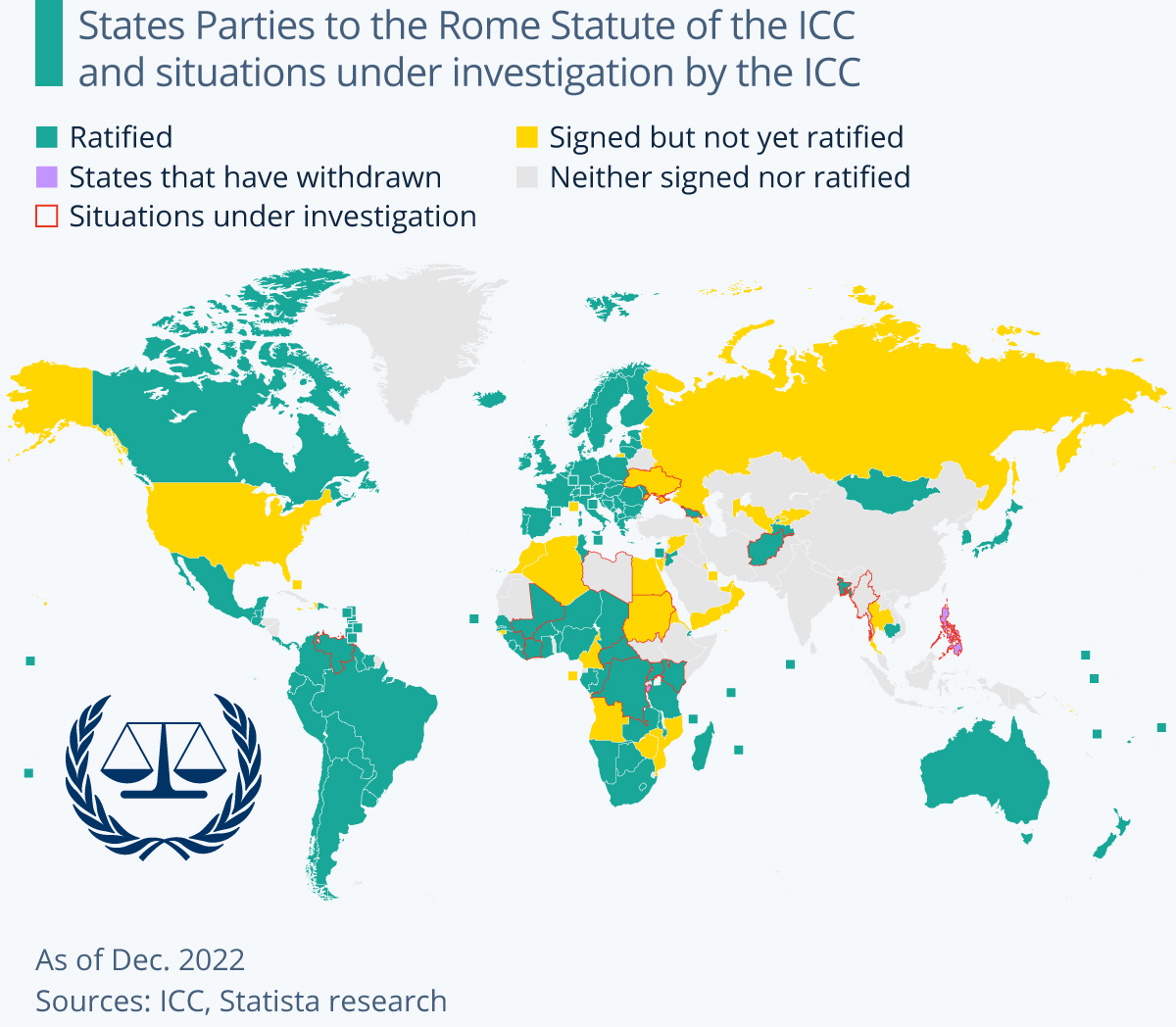24 Jul International Criminal Court (ICC)
This article covers “Daily Current Affairs” and the topic details “International Criminal Court (ICC)”. The topic “International Criminal Court (ICC)” has relevance in the “International Relations” section of the UPSC CSE exam.
For Prelims:
What is the International Criminal Court (ICC)? What are its functions?
For Mains:
GS2: International Institutions and their structure, mandate
Why in the news?
Russian President Vladimir Putin will skip the BRICS summit in South Africa because the International Criminal Court issued a warrant against him, putting South Africa in a challenging situation as an ICC member.
International Criminal Court (ICC)
- The International Criminal Court, situated in The Hague, Netherlands, is a permanent institution tasked with prosecuting individuals for serious international crimes, including genocide, war crimes, crimes against humanity, and aggression.
- It was created to combat worldwide impunity and hold criminals accountable under international law, irrespective of their position or status.
- It should not be confused with the United Nations’ International Court of Justice, also located in The Hague.
The Rome Statute
- Prior to its operational establishment in 2002, the International Criminal Court (ICC) was established by its founding treaty, the Rome Statute, which was adopted by the UN General Assembly in 1998 in Rome, Italy.
- To become a member of the ICC or a State party to the Rome Statute, countries must sign and ratify the statute through their respective legislatures.
- Currently, there are 123 member countries in the ICC, with the largest representation from African nations.
- Significantly, countries such as India, China, Iraq, North Korea, and Turkey never signed the Rome Statute, while others like the US, Russia, Israel, and Syria signed but never ratified it.

Functions of ICC
Judges (Presidency and Judicial Divisions)
- The 18 judges of the International Criminal Court (ICC) are elected by the Assembly of States Parties (ASP) based on their qualifications, impartiality, and integrity.
- They serve 9-year, non-renewable terms.
- The ICC President and two Vice-Presidents, who lead the Court, are elected from among the 18 judges.
The Assembly
The Assembly of States Parties, comprising representatives from States that ratified or acceded to the Rome Statute, serves as the Court’s management oversight and legislative body.
The Crimes
- The International Criminal Court (ICC) has jurisdiction over four main crimes under its founding treaty, the Rome Statute:
- Genocide
- Crimes against humanity
- War crimes
- Crime of aggression
- The ICC can prosecute serious violations, such as murder, rape, torture, and attacks against civilian populations.
- The crime of aggression involves the use of armed force by one State against another’s sovereignty. On 15 December 2017, the Assembly of States Parties adopted a resolution activating the ICC’s jurisdiction over the crime of aggression from 17 July 2018.
The Jurisdiction
- The Court can exercise jurisdiction if genocide, crimes against humanity, or war crimes occurred on or after 1 July 2002, under these conditions:
- The crimes were committed by a State Party’s national.
- The crimes were committed within the territory of a State Party.
- The crimes were committed in a State that accepted the Court’s jurisdiction.
- The crimes were referred to the ICC Prosecutor by the United Nations Security Council (UNSC).
- The UNSC can refer cases, and acts of aggression can also be investigated, regardless of States Parties’ involvement.
- If the UNSC doesn’t refer to an act of aggression, the Prosecutor may investigate with certain conditions.
- The Court’s jurisdiction for a crime of aggression is limited for States Parties that haven’t ratified or accepted the relevant amendments.
Charges on President Putin
- Warrants were issued against Putin and Lvova-Belova for alleged war crimes of unlawfully deporting and transferring children from occupied areas of Ukraine to Russia.
- The charges fall under the Rome Statute’s Articles 8(2)(a)(vii) and 8(2)(b)(viii).
- These alleged crimes took place in Ukrainian occupied territory since at least 24 February 2022, when Russia invaded Ukraine.
- The ICC is the international court responsible for prosecuting such crimes under the Rome Statute, adopted in 1998.
Doubts over ICC’s the authority to prosecute President Putin
- Russia has consistently stated its non-recognition of the International Criminal Court’s (ICC) jurisdiction.
- The ICC’s authority extends to offences occurring after July 1, 2002, within countries that ratified the agreement or committed by nationals of such countries.
- Russia, the United States, China, and India are not among the 123 States Parties to the Rome Statute that acknowledge the ICC’s authority.
- Ukraine, although not a State Party, accepted the ICC’s jurisdiction for alleged crimes committed on its territory during specific periods in 2013 and 2014.
What is BRICS that President Putin won’t be attending in person?

Sources:
Why Putin won’t go to South Africa for the BRICS summit in August | The Indian Express
Infographics- Valdaiclub.com
plutus ias current affairs eng med 24th July 2023
Q1. With reference to International Criminal Court (ICC), consider the following statements:
- The International Criminal Court (ICC) is a permanent institution located in South Africa, responsible for prosecuting individuals for international crimes, including genocide, war crimes, crimes against humanity, and aggression.
- The ICC can prosecute crimes that occurred after July 1, 1945.
- The ICC can prosecute crimes if committed by a State Party national, within a State Party’s territory, or in a State that has accepted the ICC’s jurisdiction.
Which of the statements given above is/are NOT correct?
(a) 1 and 2 only
(b) 2 only
(c) 3 only
(d) 1, 2 and 3
Answer: (a)
Q2. Consider the following statements:
- India
- Iraq
- South Africa
- Turkey
- US
- Russia
How many of the abovementioned countries have not signed the Rome Statute?
(a) Only Two
(b) Only Three
(c) Only Five
(d) All Six
Answer: (b)
Q3. Discuss the role of the International Criminal Court (ICC) in prosecuting international crimes and challenges faced by ICC.



No Comments